After collaborating on the wonderful album "The Great White Sea Eagle" James Yorkston, The Second Hand Orchestra and Nina Persson bring James Yorkston's latest songs onto a stage surely near you too. I had the fortune to see them on May 12th 2023 in the Harmonie, Bonn, Germany, albeit without The Second Hand Orchestra. It turned out an intimate and ever so tender, beautiful performance not least due to Nina Persson's magical voice. Thank you ever so much, Nina and James, for taking the time too for an interview which follows below. As for the readers: Don't miss out and also you might be interested to hear snippets of the interview, with music of course, on my radio shows.
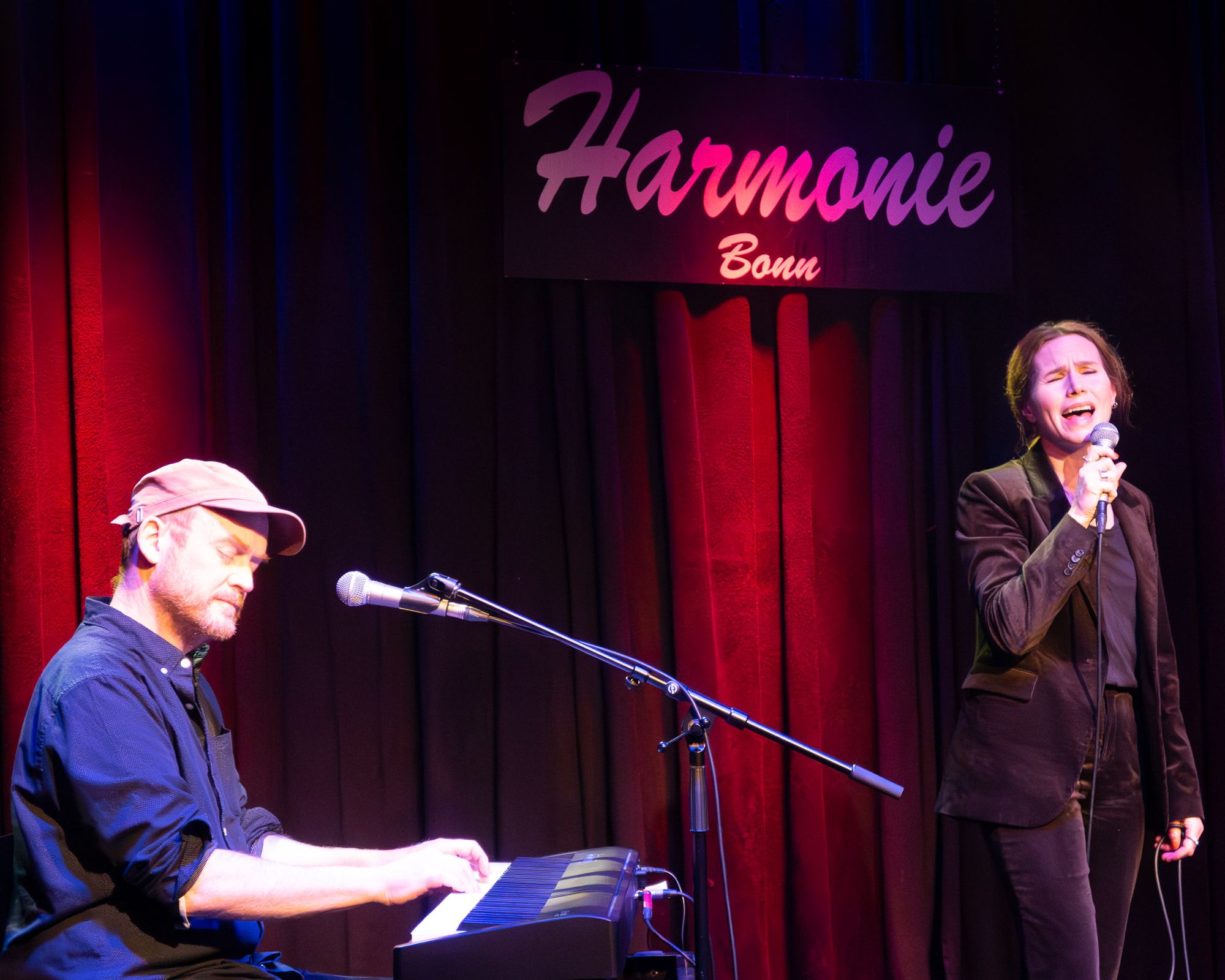
Offbeat Music Blog: Hello Nina! People have been wondering what you are up to now, wanting to know what happened to The Cardigans, whether you have been working on solo material and one of my colleagues pointed out that you are actually doing a collaboration with James Yorkston. I will not ask whether The Cardigans will be coming back..
Nina Persson: Well, we are. We're probably not going to make any new music, but we're playing shows all the time but no, you won't hear any new recordings. I think I pretty much can say that but we have some shows this year. We have a world tour consisting of Norway, Denmark, Belgium and Jakarta, which is crazy. We exist but we're quite invisible.
OMB: A lot of people - at least in Germany, unless they are true fans - would not have come across your solo material where you ventured into other genres too. I was thinking, as a singer you can sing and reinterpret classical music, jazz and folk but in indie music it is not that easy as mostly the indie artists would like to sing their lyrics themselves or mostly. Is this one of the first instances where you're actually invited in to sing songs in?
Nina Persson: I've done a lot of collaborations that would be in a similar genre, I'd say, but mostly I've sort of been guesting on songs, you know, doing a duet here and. But I think I haven't done anything where it's like this one, this much material together?
OMB: One review of the album "The Great White Sea Eagle" stated, that James should have got you in at an earlier stage of the songs for more input and more imprint. Fact is though, that he did not because the collaboration got initiated through the Second Hand Orchestra which was on board pretty early. So the songs had been ready and were presented to you?
Nina Persson: To all the band. Pretty much. I'm actually the one who got to hear them slightly before the rest of the band because I asked to, because I was nervous and new. Usually you would get presented with the songs in the studio.
OMB: And did it click with the songs straight away?
Nina Persson: Yeah, absolutely, Because I got sent, like, two or three songs to begin with and I really, really liked them. But that was only because the process was new to me - I've never made a record live before. So I had that anxiety, well, not anxiety. But I just felt raw to it. I didn't want to be messing things up when I came in. James allowed me to have a listen, and then one session before the recording when we sat and sang together which was an exception.
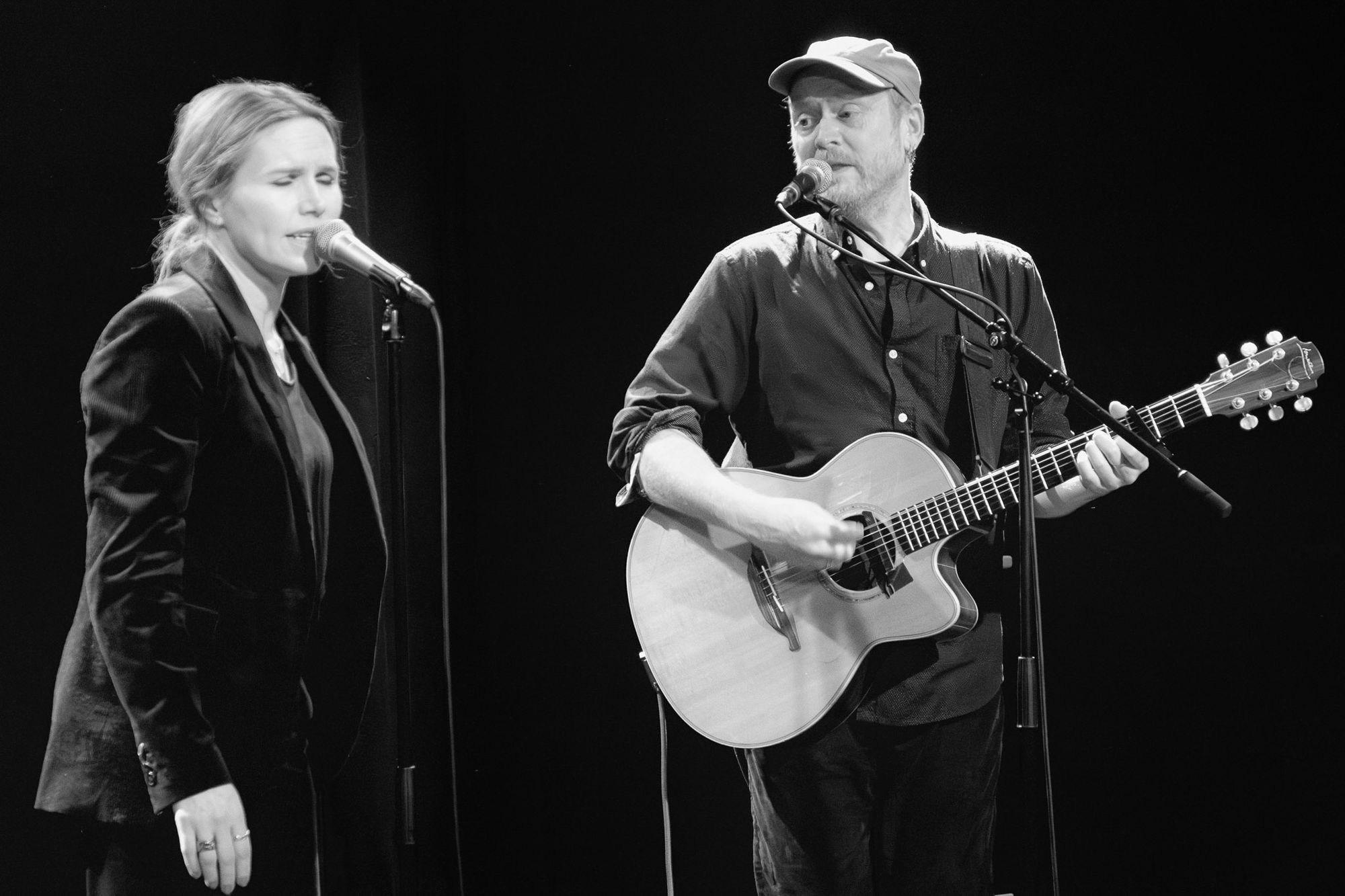
OMB: How did and do you feel when when Nina sings the songs either together or solo parts, James? Do you feel she changes the perspective with her voice?
James Yorkston: My voice is a little unsteady. It's not a hugely controllable instrument. Of course I try my hardest. So having Nina singing the songs for me, is rather wonderful because she's got a beautiful voice. So for me, having her on stage is a luxury that I haven't grown out of yet. It's heartwarming hearing her sing the words when she gets them right quite often. No, no, no, I'm joking. No, it's wonderful. You can imagine, my two favourite instruments are the violin and the human voice. There's so much expression, so much beauty and warmth in what a person can sing, you know. And just being so close to someone on stage when they're singing it, it's huge. I feel charmed and very lucky to be able to be here on stage.
OMB: For you, Nina, it is also different on stage because you're not fronting the audience all the time. You can also take a look at the band once in a while and be more with them on the stage.
Nina Persson: Yeah, when we're playing with the full band, there are especially two people who are such equilibrates who tend to have long solos that are different every night and it's a ride. Just being able for those long periods to be standing there and fucking diving into what somebody else is doing is amazing. Usually the set up of a pop group is that the singer is slightly in front. They don't have eye contact with people on stage. There's space in our band, even just me and James playing as a duo. There's more space to have a connection. Also to share the communication with the audience. Actually it is something I had been longing for. For a while my dream was to be asked by some band or somebody to come on tour as a backup singer, you know, to go on tour and be just part of group. This is really fulfilling.
OMB: Tonight you will be playing as a duo and James, you will be on the piano which you composed the songs of "The Great White Sea Eagle" on as well.
James Yorkston: Most of them I wrote on piano. During lockdown because I had never played the piano. Well, of course I had, you know, But I'd never made any effort to learn how to play or anything like that. I wrote on piano and I found, melodically, it was very freeing, but it's the same with anything in life. The things that are interesting, you're drawn towards. They're so much easier to do because you've got an interest in them. Before you know it, you've written half an album, and that's what I was like with the piano. I was like, oh, wow, you do that, then you get this noise and you can do two things at the same time It was a lot of fun to be doing. Nobody could hear me in my studio. It was completely free. Noone's expecting a piano album, so there's no pressure or anything at all. I've loved playing on the piano. It's funny now because although it's good fun playing on the piano on stage, I have most fun when I'm on the guitar with the full band, because then I too am in amongst the the band. But normally, if I'm on the piano, I'm at the side of the stageand that's great too. But it's more fun being within, getting to dance around a bit and being a bit of a wally. The funny thing about being in the band. There are a few people who like to suddenly be doing solos and stuff. You never quite know where it's going to happen. Nina and I will be pushing the song along and then it starts going down a hill, and we don't really know where it's going to go until it gets to the end. Which is a great fun when it works. Sometimes it is too loud but I mostly love it.
OMB: But it shows great musicianship from the two of you to be able to adapt.
James Yorkston: We're very secure because we've done so many duo shows that we kind of know when we're going to come. There was a review in a Swedish paper from two days ago that called it controlled chaos or something. Which is kind of kind. I would rather that than dull and middle aged.
Nina Persson: Yeah, absolutely. I think that is sort of one of the ideas of the big band. It's going to be fun.
James Yorkston: It's going to be fun, you know, because we don't make any money off an eight-piece band. So there has to be a lot of fun behind.
OMB: And The Second Hand Orchestra are known for a slight amount of spontaneity.
James Yorkston: It's tremendous. I'm missing them now as we speak of them. A tear is welling in my eye...
OMB: Aaaaw...Did you find, in case you have not met in person before that there is a kind of a connection - I'm imagining, like the great White Sea Eagle flying from coast to coast - between Scotland and Sweden over the North Sea.
Nina Persson: Interesting. I will say yes. We have been in the village where James lives, and we've been touring around Scotland. I feel a strong connection, but I don't know if it's because I feel a likely similarity between the cultures or that I just love it. We share a lot of values. I do think that Sweden and Scotland have more in common than Sweden and England.
OMB: It is of course a generalisation every individual in the country might think differently.
Nina Persson: Of course.
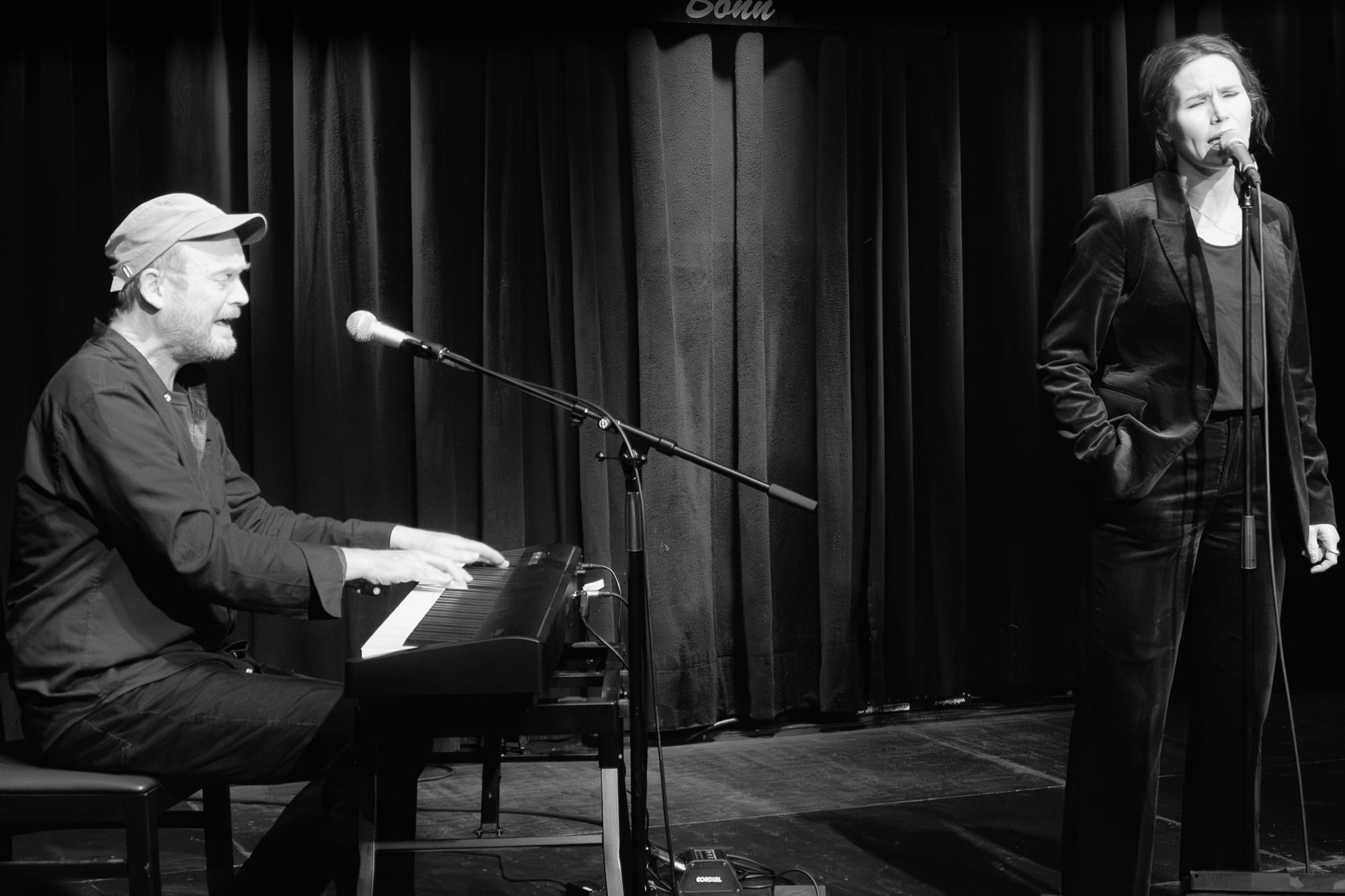
James Yorkston: For me it feels very natural. I mean, Sweden were the first way back in the old days when, as part of the thing called the Fence Collective went on and the Swedish media were the first people I can remember coming over and filming us and reviewing us. So I've been coming over to Sweden since 2002, playing solo or with for instance The Second Hand Orchestra. We work with the same booking agent that I worked with in 2003, the same promo guy and K.J., the main guy of The Second Hand Orchestra. So for me, it feels quite at home there. K.J. has been coming over to Fife again since about 2004, 2005. I have met him loads and loads of times. Peter [Morén] I met previously as well. There are loads of connections. I think the language is very similar. For example, if I say see you tomorrow morning? "See you in the morns". It means something very similar in Swedish.
Nina Persson: "Ses imorgon". The Vikings made a connection back then.
James Yorkston: My brother did one of those DNA things he had been given by his work. So And they said, Hey, we should all do this. So I did a DNA thingand it came out as a 65% Scandinavian. So I'm practically Scandinavian anyway.
OMB: Yeah, you were speaking of The Fence Collective. You are very lucky with your label Domino but before that you were with Fence. Are you still in contact?
James Yorkston: I see Kenny in the street, and I'll go and I'll give him a hug. Our children went to the same school. But I don't see him for music anymore since Fence split up. We kind of went our separate ways for reasons which I can't really talk about. But I'm still friends with Kenny and Johnny [Lynch] who was the other main man at Fence, now Lost Map.
OMB: Part of the Fence artists also went to Lost Map?
James Yorkston: Johnny is someone that I still call up to ask for advice. He's younger than me, maybe 10 years younger than me. He's always full of ideas, you know? On the tour we did recently, I asked him if he could think of any interesting artists that could open for the tour in the UK. And he suggested, um, a lovely young lady called...
Nina Persson: ...May Ellis. What's the first name?
James Yorkston: It's not Imelda May.
Nina Persson: Amy!
OMB: Amy May Ellis, from Yorkshire and doing, um, sorry, the dirty word. Folk music.
James Yorkston: Well, it's not.
OBM: It's really brought into the present...
James Yorkston: (Insists laughingly). She does pop music, but she's very good. He suggested her. He's a lovely guy that I'm still in touch with. In fact, the last email he sent me, he was so nice about one of my books that I haven't been able to reply because he just said so many nice things. I decided, what am I going to say to that? So I'll have to respond and say "hanks, man, but I can't say anything back but thank you very much. So I'm still in touch with them. And, of course, I live in the village. Still, So I still see Jenny, HMS Ginafore, walking around and we'll say hello. We'll stop and chat and things. But it came to an end and it had to come to an end.
OMB: Well, there's a time for everything. Speaking of both Domino and the folk word. In your book "It's lovely to be here" where you do a kind of very funny tour blog, you you wouldn't want to be introduced as someone doing folk music. But you get introduced as such, even by the label. What's wrong with folk?
James Yorkston : Folk, for me, growing up, has always meant traditional music. It has never meant acoustic guitar singer-songwriter, so it has never meant Bob Dylan. It has never meant Nick Drake. It has never meant Paul Simon. Folk, for me, is traditional music. So it's the traditional music of a country. For example, if you went to Greece and you were having a lovely meal in the Taverna and there were some people playing traditional music and then on the way out of Greece you saw a CD, the folk music of Greece and you'd buy it and think, oh, I want to recreate that music. But then, if it was a guy going "Oh, I'm feeling a bit sad today". That's not folk music. It's pop music. So that's why I think what I do is pop music. It just isn't very popular.
OBM: Maybe because a lot of people don't want folk music to be modernised?
James Yorkston: It's nothing to do with modern. It's nothing to do with modernised. Folk, for me has always meant traditional music, which is the traditional music. It's not me writing songs about my cat. That isn't traditional music. It never has been, never will be. It's just pop music. That's how I feel about it. That's how I was brought up to think about it. So it's semantics. That's all it is.
Nina Persson: It's like that term world music is another funny term.
OMB: World music is a horrible term.
Nina Persson: It's fucking racist, that term, in a way.
James Yorkston: But you're world music, you understand, Swedish for us is world music.
Nina Persson: Exactly, that is where we would be.
James : Like Cecilia.
Nina Persson: It's like Third World music which is really what it means which is quite...
James Yorkston: Hmmm. Sometimes it means that.
OMB: Or "Women in rock", isn't that horrible? Like you get like these compilations with female artists on them who have nothing else in common.
Nina Persson: Which came in the Nineties.
OMB: An Eighties/Nineties thing.
Nina Persson: It was meant well, it's good for a period, but you can't really stick to the genre.
OMB: You have a song, James, on the album "The Route To The Harmonium" which is one of two of the not so soft songs on the album: "My Mouth Ain't No Bible".I always understand it that way that you didn't become like Michael Chapman or Michael Hurley, Peter Brötzmann and Martin Carthy. I wondered, did he not want to become like these artists or does he regret it?
James Yorkston: No, it's a song about my friend Vince who killed himself. It's a song about how I was furious with Vince and it's a song about how he could have been a lifer. Could have stayed up doing music all his life. A song about him. So I'm angry with him and throughout the song there is a dark humour. For example...that song is gone out of my head. It's a very, very long song. It's packed full of lyrics.
OMB: Very, very intense, also musically.
James Yorkston: Yeah, I don't think we'll ever do a version of it. [To Nina] Yeah, you can hear it, but...
OMB: It's like he's spitting it out.
James Yorkston:. I was very, very angry.
OMB: That anger. And there is this upsetting goodbye in it as well.
James Yorkston: Yeah, yeah... I can't remember. I can't remember the lyrics. I was just so annoyed with him. But that's life.
OMB: There was another fast and furious song as well: "Yorkston Athletic".
James Yorkston: Yeah, the other one was talking about immigration. I was just saying: Well, what would you do? If it was your family at risk, what would you do? But both of those tracks were recorde back in 2003. So the music underneath that music was with my old band in 2003, and then I added new vocals. I should not have put it on the album but I did. And I don't know about you. You do things that you're not quite sure about. You know, it does fit in. It's the weight on the album. It's the other weight of the album that keeps it balanced. I love that album, But what can you do?
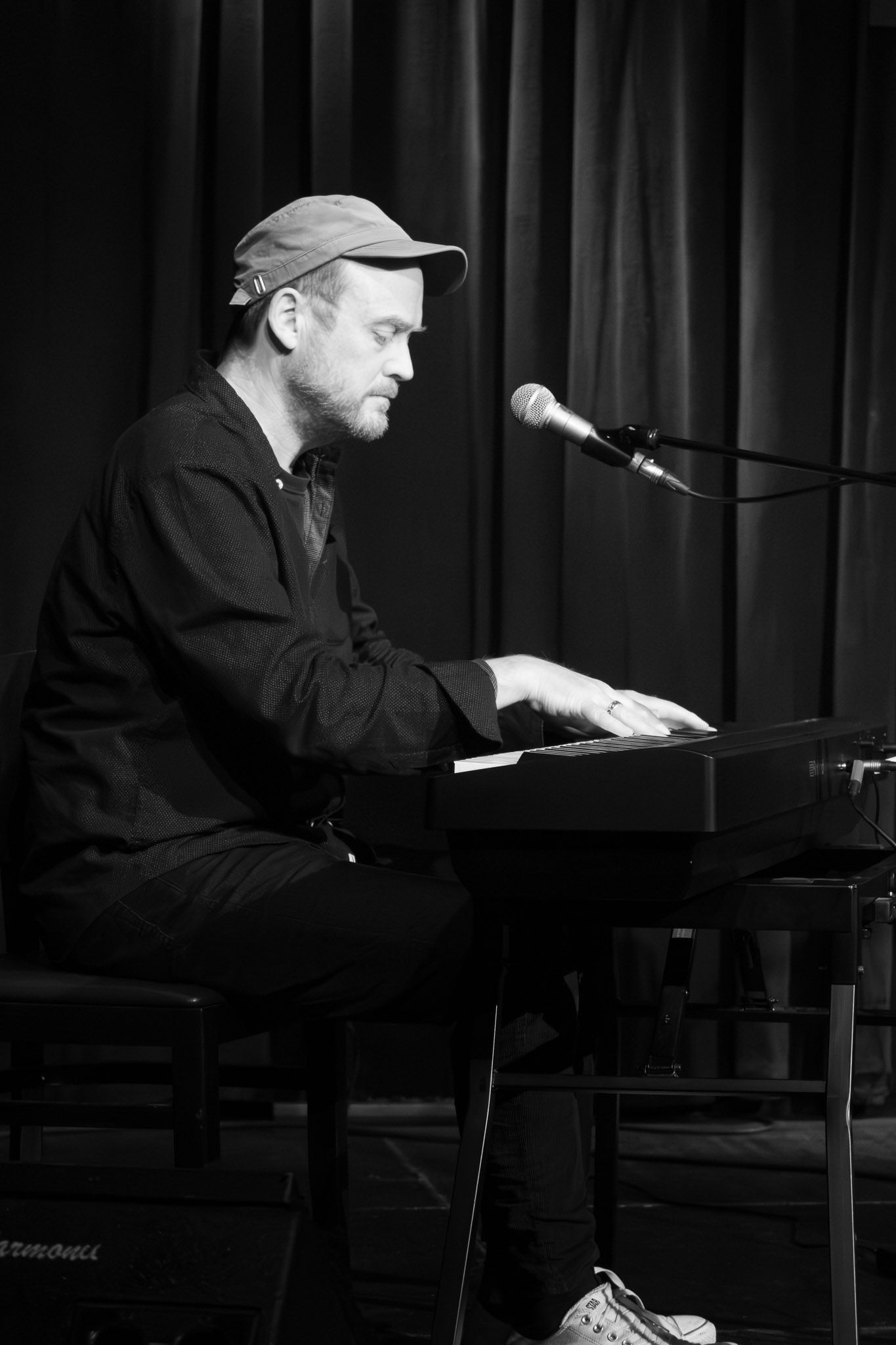
OMB: Yeah, you always you do so many different things. Apart from writing but also so many different things musically. You said somewhere that you don't want to repeat yourself either. Is there a pressure that you don't want to repeat yourself?
James Yorkston: I think I'm in a very, very lucky position. Whereas no one knows who I am but somehow I make a living out of music. I'm not a big name anywhere. I'm like a cult name, you know. The people that know my music that sort of - I don't want to say fans - but are interested and seem to be following me and supporting me. Maybe 10 years ago, 15 years ago I had slightly enough money that I could forget about money, you know, or at least tell myself I'm forgetting about money. So now I just do the music that I absolutely love and there's no worry about getting a single mix. Or maybe we should get a proper drummer in or anything like that. It's just aimed at the music I love. So that's why I've been so lucky with Yorkston/Thorne/Khan because it was like a magnet drawing me to it. The music was extraordinary, and it's very, very similar with this project, very similar. It's doesn't feel like work at all. It just feels like it's pulling me towards it. It's like a massive help getting up the hill, you know, because everyone we're working with is so good, and they they're all of an age that they don't have that kind of terrible ego that you you meet when people are younger in the music business. Yeah, just go where? Go where the love is. And it means it's more natural. It's more exciting. It's the worst thing to try and do something because you think it might be a hit or something like that. It would be the worst thing to do as it's soul destroying. Working with people I love. It's a completely different thing. It's so much easier, so much more fun and more enjoyable.
OMB: And you have the label behind you that allow you to do that.
James Yorkston: Domino are amazing, but they don't do that with with everyone. Not everyone gets to stay on Domino. You know, they've been very good to me.
OMB: Sure.
James Yorkston: There's only been one time with Domino. Where they've said to me, you need to write some more songs for this album. You haven't got enough. And it was true. I didn't have enough as I had an awful situation in my family life. Like with Yorkston, Thorne, Khan: Just an email. Hey, can I go and record an album with this guy? He's a Sufi player and singer from New Delhi and John Thorne. You know, he's like a jazz bassist? - Yeah, sounds good...That's all it was. It was very similar when I said: Oh, listen to this. And Nina Persson, she's going to come on board. What do you think? Oh, yeah, it sounds good. Don't make it too poppy. Me: No, don't worry, man. Won't do any of that stuff. It just carries on. So they've been very supportive. As I said, they're not supportive to everyone. If you're not delivering the goods, they will let you know.
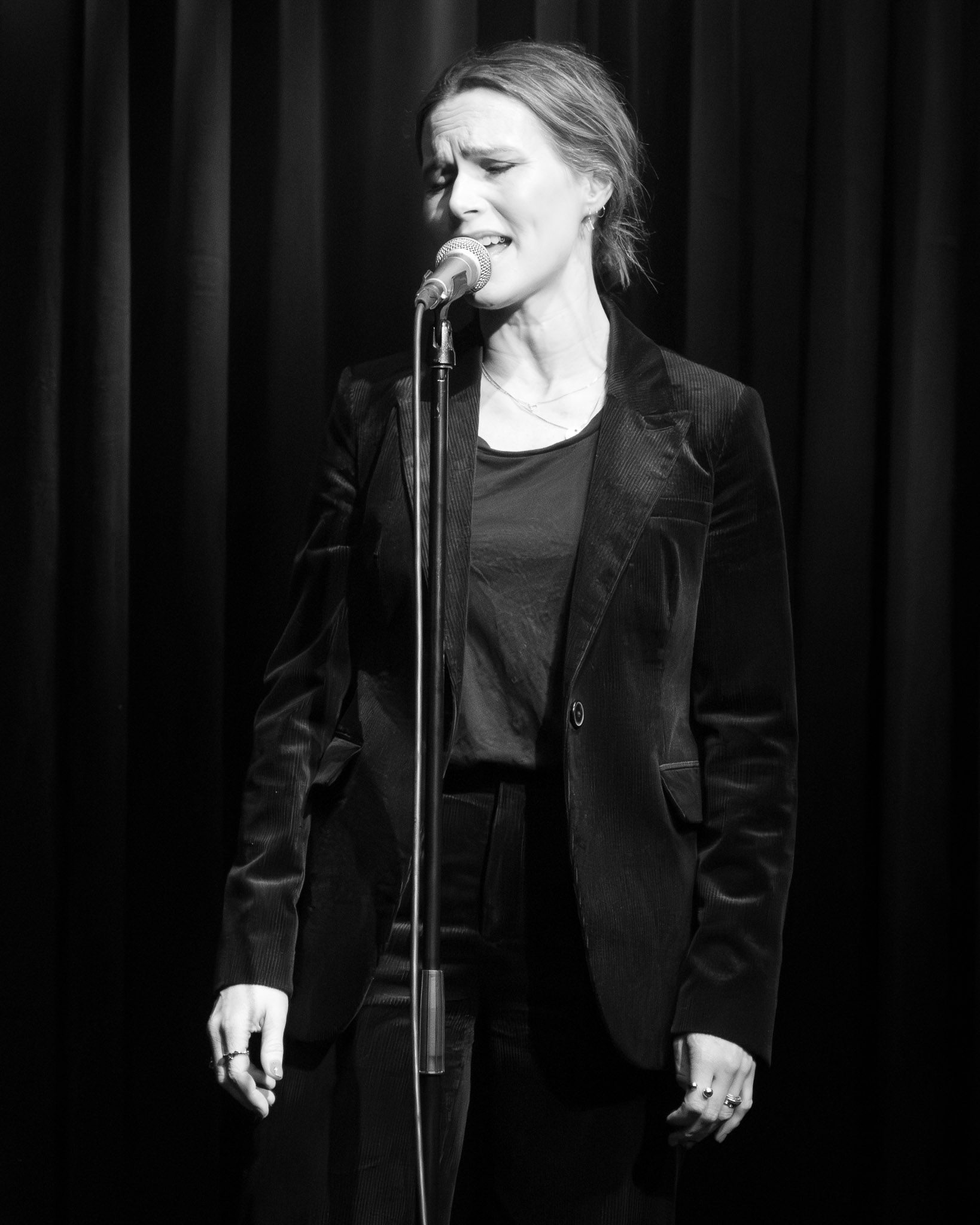
OMB: You, Nina, experienced of course, pressure to deliver hit singles. But you still managed as The Cardigans to do what you liked and and sort of keep the pressure at bay. That was an extraordinary feat, actually, because a lot of people would have caved in.
Nina Persson: Yeah, we had some battles. We refused the label to ever appoint an A & R to us. So we just said yes, we'll make another record and we'll tell you when we're done, and then we'll call you. But that was great. And we set those rules and they let us do it.
OMB: I so understand. I get promo people approaching me to "work" on an artist and if the music is not my thing, it is not my thing. For me music means a lot and it is a hobby. You could try and pay me, that would not change a thing. I still would not like some music and if I conformed, my hobby would be spoiled.
James Yorkston: Actually, that's it, spoiling your hobby, and that's exactly the thing when you're doing music that you don't want to be doing. OMB: You might make money, but the love is gone. James Yorkston: But I have to say, for some people A&R is really handy. I was signed when I was 30 and already had my ideas of who I wanted to be and what I wanted to do and what I didn't want to do. For example, I didn't want to be called folk music [har har], but for some people, they have one hit. They've written an album when they're 18 or 19 and then they don't know what to do. And they literally need a good A&R person to come in, even if they just say, take your time. But sometimes A&R people can help, even if all they do is say, Don't panic. Take your time. You don't have to produce another album yet.
OMB: Sort of like a puffer inbetween?
James Yorkston: I have a friend who's doing very well at the moment, and they are feeling that they need to produce another album quickly. And I'm just saying to them, No, no, no, you don't have to. Don't worry. If you release an album in March, that's no good. You wait till August. And if the album is two songs better or one song better, it's going to do so much more good than releasing an album earlier. It's so important getting it right if you're thinking along a career path. So sometimes if you have the right A&R person, that can be good.
OMB: The sales and everything have changed, of course. When you're kind of off the beaten track, it doesn't bring in big money, but it has a secure fan base, whereas if you are delivered out to the world of Spotify also and it's all counted in streams and clicks, then it's really hard, you know, say if you are with a major label. It's pretty tough. And then maybe it's good to have somebody in between.
James Yorkston: Presuming of course they stay with you. If if they move on to another label, then you can be sunk. You know, if your point of contact leaves. Although, you know, I'm not the person to ask about major labels. OMB: You'll be playing songs of "The Great White Sea Eagle" tonight. Hearing the album for a couple of times, it seems very much - well, everybody has a pandemic album now - but part of it seems like: OK, I am at this point of my life and I am looking back, accepting, concentrating on the small things.
Nina Persson: You're looking at me. I would say no, but I think that's a question for James.
James Yorkston: I don't say no as well. It's funny doing these interviews because it does remind you that you're doing interviews and you're part of a business as well, and it's very flattering as well, especially with someone like you who knows the music. It's very flattering, but it's not in any way written like that as though there was [a plan?]. I find the best way to write - Nina teaches writing now - is to have no boundaries, no thoughts whatsoever, just to write and just to let the writing come out. But then to concentrate when it comes to editing, It's not as though I have sat down and thought right, this album is gonna be like this. It's just more a question of knowing when things come, knowing when inspiration comes and catching it. That's really important, as I'm sure you know, not letting it go. So, for example, we were supposed to be at a meeting in the hotel, but we didn't meet because I wasn't hungry. Then Nina fell asleep and then, it doesn't matter: We did not meet, and so I was just sat down in the hotel lobby and some ideas came for lyrics and stuff, and it's just a question of catching it when it's there and writing it down. I guess what I'm trying to say is I think sometimes, analysing it and looking back and saying, Oh, what was it? I don't think that's maybe the most positive thing to do. I think it's more about moving forwards and getting on with the next thing. But for example, that song you talked on "The Route To The Harmonium" album: Imagine in a different parallel world that had been a huge hit. It was never going to be a huge hit. But imagine it had been, and imagine having to write another one like that. I just think it'd be a very tricky thing to do, anything that places any kind of restriction on your writing.
OMB: Sometimes when people do write a lot about their album and it's a concept album and they wanted to do this and this and this with it and I am like, if that was the case, you'd have never finished the thing you know, because it's so much So it's always like looking back on it. You could maybe say, well, subconsciously maybe this came out and it is there. But also, as you said, it came out and that's it.
James Yorkston: Everything. Everything affects anything when you're a writer. I think, for example: People used to ask, does living by the coast where you come from, does that affect your writing? And I always just said, no, it doesn't affect me, but I'm sure it does. And now, working with Nina, I've been writing new songs and of course, the fact that Nina may sing some of them, affects them. It's just anything affects you. I mean, you have a cup of coffee and it affects you, you know what I mean?
OMB: Subconsciously?
James Yorkston: But I think the important thing is not to question and let it flow.
OMB: You teach writing at the university, Nina?
Nina Persson: Yeah, the Rhythmic Conservatory in Copenhagen. I was just thinking, I have one student now who's doing her bachelor, a work on authenticity. And it's so interesting. It has very much to do with who is an author anyway. And what is an author and what makes you an author and it's about the collective, authorship, also - that we are everything that has ever flown through us. So I was thinking about that when you were talking about it.
James Yorkston: No, it's true. I mean, that's ...I was just gonna go into the traditional thing again.
Nina Persson: You want to bring that back up again?
James Yorkston: Yeah, yeah. [Laughter].
OMB: It's also often a stream of consciousness thing, isn't it? And it just spills out.
James Yorkston: With writing? Yeah, it is. Although after those two songs that you spoke about in the last album, I definitely tried to pare things back a bit. For all sorts of reasons, but artistically. You know, I love "Pet Sounds". You know, I love that album. I love "Fifth Column" by U.N.P.O.C., you know, these great albums of great pop songs. Then there's a song by Carl Perkins called "Glad All Over". It is two minutes long. It's just a perfect slice of rock and roll and I love it.
OMB: There are a lot of people that as soon as music becomes successful or is too poppy, it is just not hip to like it anymore.
Nina Persson: I think it's really interesting right now. I don't follow the pop scene too closely. But what I hear, I think, is amazing because it is really brought right now is really interesting. I think there's been a much bigger acceptance for it. Now it's It's not that pop song. There's nothing simple about it. I think that right now also what's coming out, it's really, really cool. Even like the commercial pop, like the American scene and a lot of British ones, too. I think it's on a fantastic level, often times, and it's broad and successful and commercial.
James Yorkston: When I was a kid, I I used to love bands like Erasure and Pet Shop Boys and Soft Cell and things like that. You know, Donna Summer...That's pop music. Or even at that age, I was really into punk. You know, punk, was my thing. But even through that, there was always just pop, you know, it's fantastic.
OMB: I think that there shouldn't be any genres, really.
James Yorkston: I can see why they exist. Of course, when you're in record shops, you look through the such and such, but yeah, no, I totally agree with you.
OMB: And most of the time, it's wrong, isn't it? Like the recommendations you get because you listened to such and such, especially online.
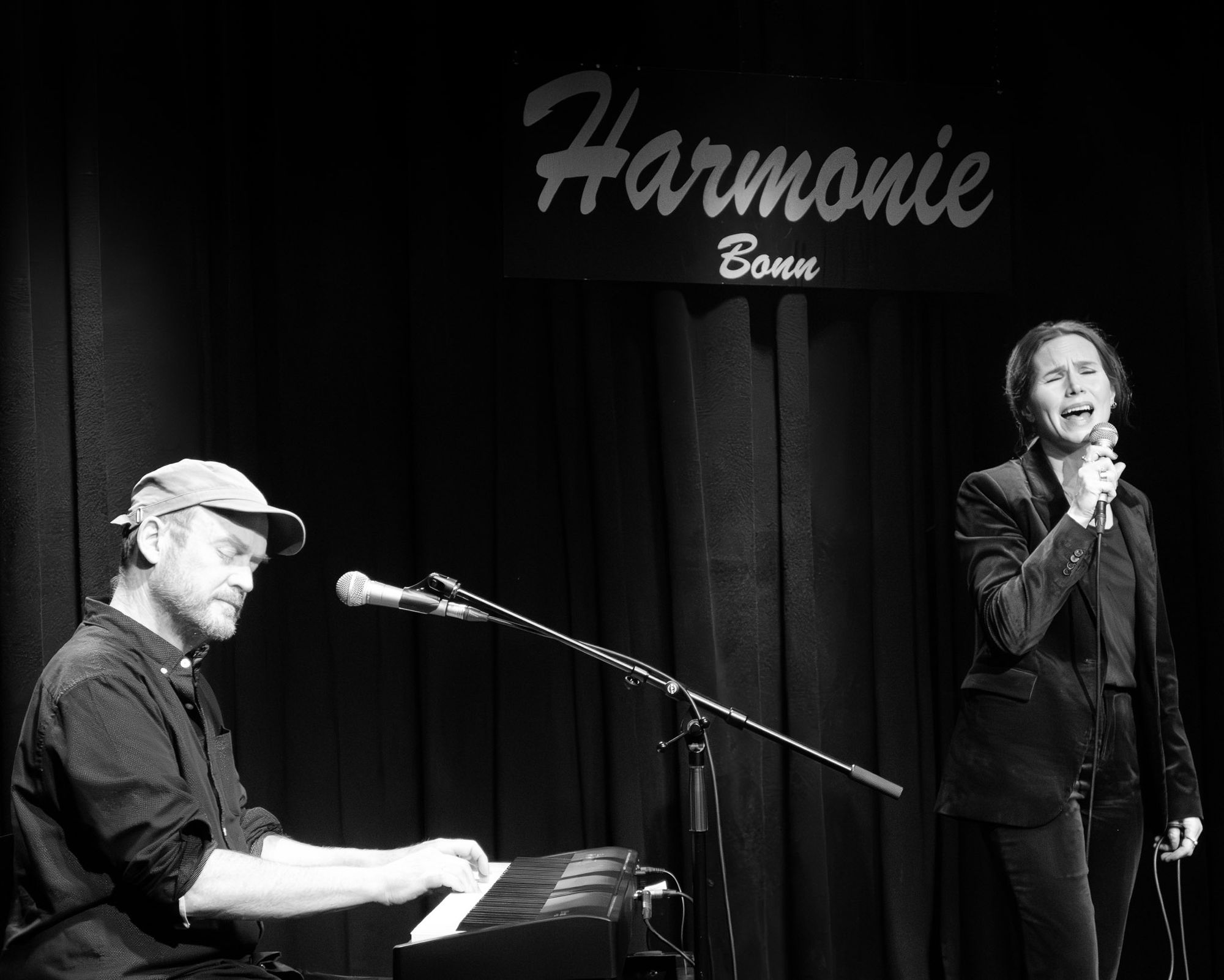
Nina Persson: Yeah, that's always insulting. I never like I never liked my own. But especially if you have a child. Do you have your child using your Amazon account?
OMB: You mean the very often mentioned statement in our household: Don't ruin my YouTube history?
Nina Persson: I know. Yeah, we need our own account. It's important.
OMB: The artificial intelligence, I think, still cannot replace the human. It certainly cannot replace a good concert and no matter what instrument you're on. But then you, James, have the really exceptional collection of instruments.
James Yorkston: Yeah, Yeah. I mean, that's something which I did for a long time. I collected lots of weird and wonderful instruments with the idea, it would help differentiate what I was doing to what so many other people were doing at the time. So I used to collect the scrapyard instruments, and that's what you can mostly hear on that "The Route To The Harmonium" album Is that all those instruments being played in one way or the other. But yeah, I don't know. It's a funny thing. The A I ... It will lose a lot of people jobs, especially in art. Purely selfishly, I don't know if anyone is going to ask an A I thing to write a good James Yorkston song. So I think I might be OK. And even if they did, I'd be quite keen to hear what it was like. I wonder what I've been doing wrong all these years. But I do think that human nature that can sometimes be quite anal, like with vinyl collection for instance, would still want the real thing.
Nina Persson: I take for example a Bob Dylan song. I am sure AI could replicate that easily but still people want to see Bob Dylan. I want Bob Dylan to be Bob Dylan. It is a fair argument. Probably AI is going to something in ten years, we can't even imagine now but somehow I think people will want the real thing.
James Yorkston: But just think of all the ABBA tribute bands.
Nina Persson: True...but I am sure people would much rather see ABBA.
And on that note, glad we got to see the real Nina Persson and James Yorkston and thank you so much!